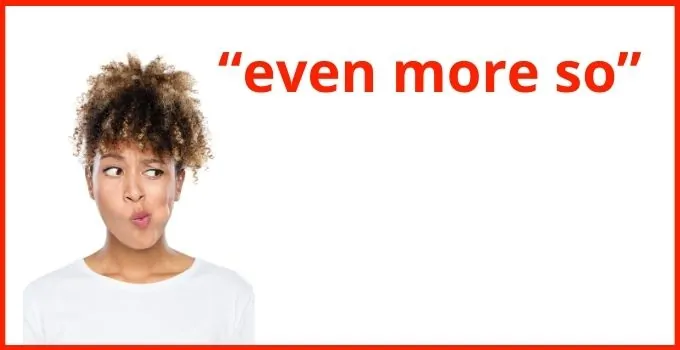Some words and phrases can be hard to use, especially if you haven’t seen copious examples.
For instance, you might have seen the expression “even more so” once or twice before, yet you might not be entirely clear on how you should use it in a sentence.
Luckily, we are here for you, and we will remedy this situation.
How to use “even more so” in a sentence?
More often than not, “even more so” is used prenominally, which means that it precedes a noun. It is used to establish a contrast of sorts.
So, if something applies to two things but applies to one more than the other, then you use “even more so.”
It should be noted that “even more so” is closely related to “more so.” The difference is that “even more so” adds more emphasis.
With this in mind, “even more so” tends to be an interjectory statement, which means that you can remove it without affecting the meaning too much.
There are a few cases though where “even more so” becomes integral to the meaning as we shall soon.
With regard to punctuation, the rules aren’t quite clear here, and everybody seems to punctuate it differently.
That said, if we regard “even more so” as an interjectory statement, then it makes sense to surround it by commas on either side, so this is what we’ll do.
Examples
The above sentence basically says that oranges and cotton textiles are both things for which Egypt is famous.
However, out of the two, cotton textiles are the more popular export. Now, to truly understand how to use it, let’s remove it from the sentence.
The sentence’s meaning isn’t altered too much. You should also note that the conjunction ties two different prepositional phrases, which are “for its oranges” and “for its cotton textiles.”
Now, I’m pointing this out because I want to highlight the importance of parallelism when using conjunctions, something that will be a recurring theme here.
Granted, the sentence could have been different.
In this case, this is what using “even more so” would look like.
Another possibility is this.
Giving us this.
Out of the three possibilities, I feel that the first one is the clearest. But, if there are several ways to write the sentence, why talk about parallelism at all?
This next example will explain.
Again, because we are treating “even more so” as an interjectory statement, then the conjunction “and” is what really matters here, and conjunctions demand parallelism.
As you can tell, “even more so” is usually used with the conjunction “and,” making “and even more so” a common construction.
Can “even more so” be used without a conjunction?
Yes, here is a couple of examples.
Here, “even more so” is integral to the meaning of the sentence, so we can’t remove it without affecting the overall meaning. Ergo, it is not surrounded by commas.
In this last example, “even more so” is preceded by perhaps, attenuating the emphasis.
It is also an interjectory statement that comes at the end of a sentence, so it is preceded by a comma and followed by a period.

Hey fellow Linguaholics! It’s me, Marcel. I am the proud owner of linguaholic.com. Languages have always been my passion and I have studied Linguistics, Computational Linguistics and Sinology at the University of Zurich. It is my utmost pleasure to share with all of you guys what I know about languages and linguistics in general.

